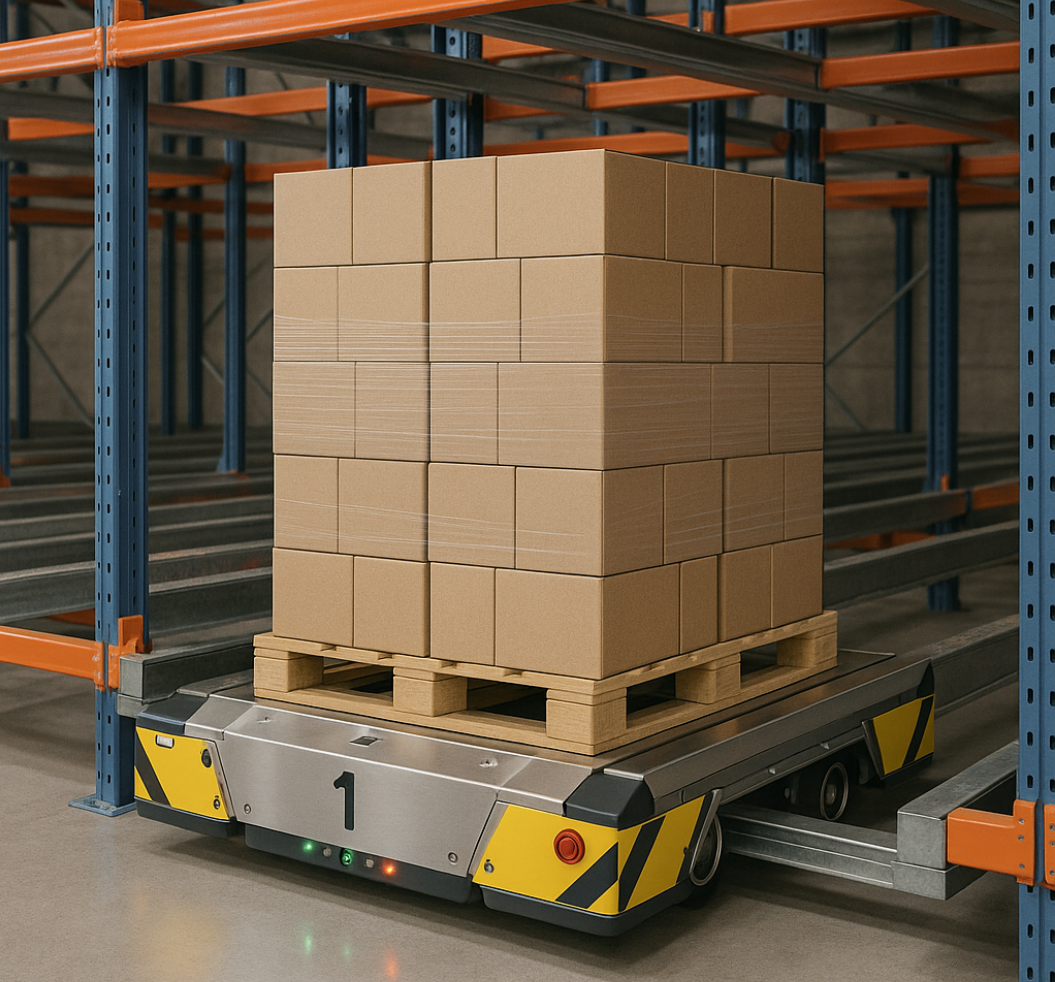Shuttle Systems & Pallet Shuttle Storage
Boost storage density and warehouse efficiency with high-density pallet shuttle systems. Our semi-automated shuttle solutions transform deep lane racking—enabling fast, safe, and scalable pallet storage and retrieval for high-throughput operations.

What Is a Pallet Shuttle System?
A pallet shuttle system (also called a pallet runner, radio shuttle, or pallet mole) is a semi-automated storage and retrieval solution for warehouses that require deep-lane, high-density storage. Pallet shuttle carts travel on rails within a racking system, moving pallets between the pick face and deep storage locations with the push of a button—eliminating the need for forklifts to enter the rack.
- Maximum Storage Density: Store up to 100+ pallet positions deep in a single lane for ultimate warehouse space efficiency.
- Fast & Safe: Reduce forklift travel, increase throughput, and minimize product and rack damage.
- Flexible Inventory: Supports both FIFO (first-in, first-out) and LIFO (last-in, first-out) inventory management.
- Semi-Automated: Remotely controlled shuttle carts handle movement; forklifts only interact at the rack face.
- Labor Savings: One operator can control multiple pallet runners—lowering labor needs and boosting productivity.
- Deep Lane Solution: Ideal for food, beverage, cold storage, and any operation that stores large volumes of the same SKU.
How Does a Shuttle System Work?
Shuttle systems use battery-powered, self-propelled carts that travel beneath pallets on rails within the rack. A forklift places the shuttle cart into a storage lane, and the operator uses a wireless remote to direct the cart to move pallets in or out. Pallet runners retrieve, deliver, or reposition pallets—optimizing workflow and reducing forklift traffic inside the system. Many shuttle systems are Wi-Fi enabled and can be programmed for daily cycles.
Key Features
- Battery-powered with daily charging
- Operates in temperatures from -22°F to +132°F
- Up to 10 hours runtime per charge
- Customizable for pallet size & weight
- Wi-Fi and remote control operation
Semi or Fully Automated?
- Semi-automated: Remote-controlled, forklift sets the cart
- Fully automated: Add AGVs or automated forklifts for zero manual forklift involvement
- Both solutions reduce labor and risk of rack damage
Implementation & Training
- Warehouse evaluation and system fit testing
- Pallet compatibility check and sample testing
- Operator training and ongoing maintenance
- Backup carts for uninterrupted operation
Why Choose a Shuttle System?
- Unmatched deep lane storage
- Less forklift traffic inside racking
- Lower risk of rack or product damage
- Rapid retrieval for high-throughput needs
- Customizable for many warehouse environments
Shuttle System vs. Pallet Flow Racking
While pallet flow racking is effective for deep-lane, FIFO storage, shuttle systems offer even greater lane depth—up to 100+ pallets per lane. Shuttle systems can be designed for both FIFO and LIFO operation and support multiple SKUs by channel, while reducing aisle requirements and forklift travel.
Shuttle System Maintenance & Operation
Shuttle systems are reliable and designed for long-term performance. Daily charging of battery-operated carts is standard, and operators receive full training on best practices for loading, unloading, and maintenance. Backup carts ensure no operational downtime, and routine maintenance keeps your system running at peak efficiency.
Is a Shuttle System Right for Your Warehouse?
- Perfect for operations needing very deep lane storage (40, 60, 100+ pallets deep)
- Best for high-volume, low-SKU or batch storage environments
- Reduces labor, product damage, and rack maintenance
- Works in a range of industries: food, beverage, cold storage, manufacturing, e-commerce, and more
- Custom engineered for each facility and pallet specification
Pallet Shuttle System Cost
Pallet shuttle systems generally range from $1,200 to $2,000 per pallet position, depending on lane depth, system configuration, and custom requirements. While more affordable than fully automated AS/RS, shuttle systems offer a quick ROI through reduced labor, improved efficiency, and higher storage density.
Shuttle System Key Features
- Advanced battery management—ensures maximum runtime and reliability.
- Custom rails and shuttle designs fit unique pallet or product dimensions.
- Wi-Fi and remote operation—allows pre-programming for high-volume cycles.
- Withstands harsh environments, including freezers and temperature extremes.
- Failsafes and alerts for maintenance or low battery status.
Semi vs. Fully Automated
- Semi-automated: Operator uses remote to control shuttle—forklift handles pallet entry/exit.
- Fully automated: Pair with AGVs or robotics for true "lights-out" operation.
- Choose based on labor costs, throughput needs, and automation goals.
- Both systems minimize forklift travel in racking for improved safety.
Implementation & Training
- On-site warehouse and product evaluation for system compatibility.
- Product and pallet testing with sample lanes before full install.
- Comprehensive operator and safety training on system use.
- On-call support and routine maintenance packages available.
Benefits of Shuttle Systems
- Optimize every cubic foot of warehouse space—fit more SKUs and pallets.
- Reduce labor requirements—run multiple shuttles with a single operator.
- Speed up high-volume batch picking and replenishment tasks.
- Lower risk of rack or product damage from forklift impacts.
- Perfect for cold storage, batch, and bulk inventory needs.

